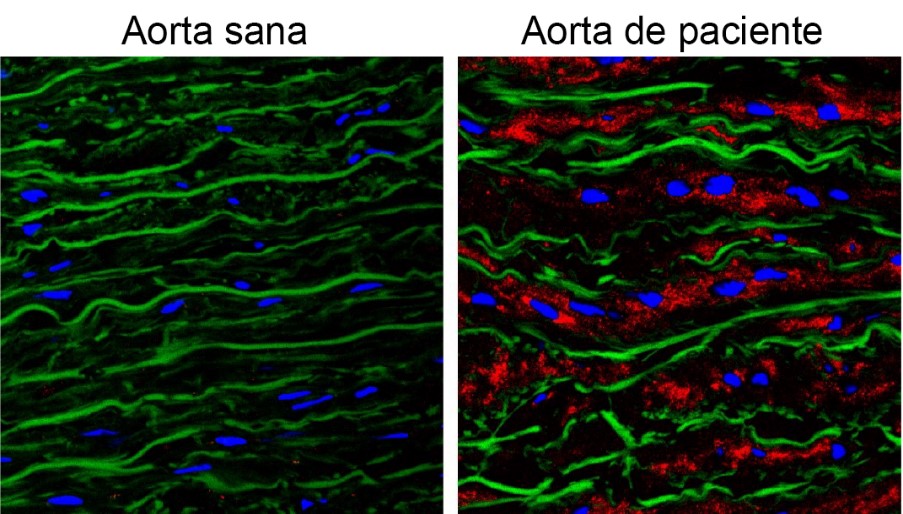EMBO Molecular Medicine: Accumulation of the protein versican is the cause of aortic aneurysm in Marfan syndrome
A team led by scientists at the CNIC and CSIC has found that accumulation of versican in the aortas of Marfan syndrome patients triggers the activation of the nitric oxide pathway through the activation of the the protein AKT
A team of Spanish scientists has identified the cause of aortic aneurysm in patients diagnosed with Marfan syndrome, a genetic disorder currently lacking treatment options. The study, published in the journal EMBO Molecular Medicine, was conducted by researchers at the Centro Nacional de Investigaciones Cardiovasculares (CNIC), an affiliate center of the Carlos III Health Institute (ISCIII) attached to the Spanish Ministry of Science, Innovation, and Universities, in collaboration with partners at the Centro de Biología Molecular Severo Ochoa (CBMSO, CSIC).
The study, led by CBMSO scientists Juan Miguel Redondo and Miguel R. Campanero, reports an accumulation of a proteoglycan called versican—a large protein present in the extracellular matrix between cells—in the aortas of patients with Marfan syndrome and of mice genetically engineered to develop the disease, known as Marfan mice. In the study, Redondo and Campanero, members of the Spanish cardiovascular disease research network (CIBERCV), partnered with teams led by fellow CIBERCV investigators Arturo Evangelista and Gisela Teixido at Hospital Hospital Universitari Vall d’Hebron (VHIR) in Barcelona and J Francisco Nistal at Hospital Universitario Marqués de Valdecilla and Instituto de Investigación Valdecilla (IDIVAL) in Santander
The new discovery identifies versican accumulation as a cause of the aortic aneurysms suffered by Marfan syndrome patients. The study also identifies the signaling pathway mediated by protein kinase B, known as AKT, as a possible target for treating aortic disease in Marfan syndrome.
These results represent an important advance in the understanding and of the aortic disease associated with Marfan syndrome. An aortic aneurysm is an enlargement of the aorta caused by a weakening of its wall. Although initially asymptomatic, aortic aneurysm can lead to serious complications such as dissection or rupture of the aortic wall, which can be fatal. "Marfan syndrome is a genetic disorder affecting connective tissue, and thoracic aneurysm and aortic dissection [TAAD] is the main cause of death in these patients," explained Redondo.
To date, no effective pharmacological treatments have been identified that can delay or prevent TAAD in Marfan syndrome. The only effective way to prevent aortic dissection is surgical replacement of the aorta with a prosthesis. “For this reason, it is essential to identify new therapeutic targets for the treatment of TAAD in Marfan syndrome,” said Campanero.
The new findings underscore the fundamental importance of the proteoglycan versican and the AKT signaling pathway in the aortic disease associated with Marfan syndrome. "We previously discovered that the aortas of mice and patients with Marfan syndrome overproduce nitric oxide due to high expression of the nitric oxide-producing enzyme Nos2 and reduced expression of another protein involved in the processing and degradation of proteoglycans in the extracellular space. We therefore investigated the role played by these proteins in the formation of TAAD in Marfan syndrome," said Redondo.
Marfan syndrome is a genetic disorder for which currently lacks treatment options
First author María Jesús Ruiz Rodríguez explained: "We discovered that versican accumulates in the aortas of mice and patients with Marfan syndrome as a consequence of a reduction in the amounts of the protein responsible for degrading and processing it".
The study also shows that decreasing versican expression by gene silencing reduces the expression of Nos2 and completely reverses aortic disease in Marfan mice.
Given the importance of signaling via the AKT pathway in other aortic diseases, the authors decided to investigate its possible involvement in the development of disease in Marfan disease. "We observed that versican is able to activate the AKT signaling pathway in cultured cells and that pharmacological inhibition of AKT decreases Nos2 expression and reverses aortic dilatation in Marfan mice," explained Campanero. "We also found that the AKT signaling pathway is activated in the aortas of patients with Marfan syndrome," Redondo added.
The identification of AKT as a possible therapeutic target for the aortic pathology in Marfan syndrome is a very promising finding that could help in the development of new treatments for this disease.
The study was supported by grants from the Marfan Foundation, the MERCK Foundation-Spanish Foundation for Rare Diseases 2022, and the V-Ayudas "Muévete por los que no pueden 2021" program, as well as professional training contracts from the Spanish Ministry of Science and Innovation.











